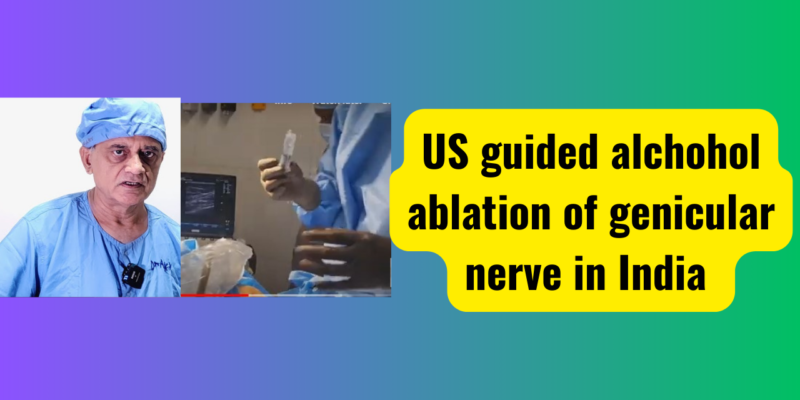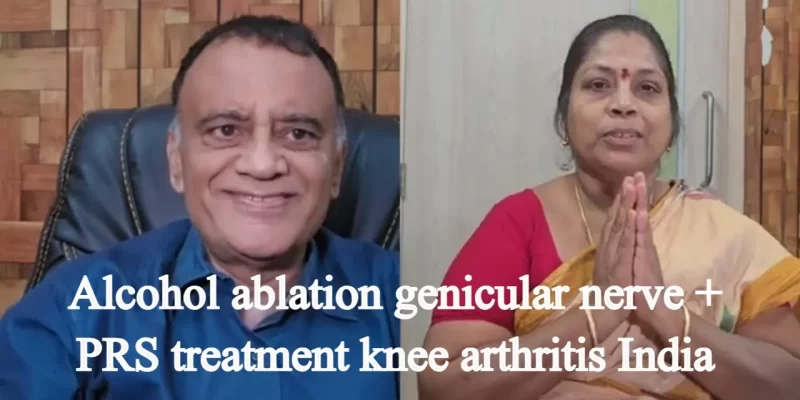I have performed alcohol ablation of genicular nerves in conjunction with platelet rich stroma treatment for knee osteoarthritis in India. See this post
Alcohol Ablation of Genicular Nerves: A Scientific Overview
Introduction
Knee osteoarthritis (OA) is a prevalent condition causing significant pain and disability. Traditional treatments include pharmacological interventions, physical therapy, and surgical options. However, for patients who do not respond to these treatments, alternative methods such as alcohol ablation of genicular nerves have emerged as promising options.
Mechanism of Action
Alcohol ablation involves the injection of ethanol into the genicular nerves, which are responsible for transmitting pain signals from the knee joint. The ethanol induces neurolysis, effectively disrupting the nerve’s ability to transmit pain signals. This procedure is typically performed under ultrasound or fluoroscopic guidance to ensure precise targeting of the nerves.
Evidence from Clinical Studies
Several studies have investigated the efficacy and safety of alcohol ablation for knee pain relief in OA patients:
Study by Choi et al. (2011):
Objective: To evaluate the effectiveness of alcohol neurolysis of the genicular nerves in patients with chronic knee pain.
Method: 30 patients with chronic knee pain underwent ultrasound-guided alcohol ablation.
Results: Significant pain reduction was observed in 80% of patients at 6 months follow-up.
Study by Protzman et al. (2014):
Objective: To assess the long-term outcomes of alcohol ablation in knee OA patients.
Method: 50 patients received fluoroscopy-guided alcohol injections.
Results: Pain scores decreased by an average of 50% at 12 months post-procedure.
Study by Kim et al. (2017):
Objective: To compare the efficacy of alcohol ablation with radiofrequency ablation (RFA).
Method: 40 patients were randomized to receive either alcohol ablation or RFA.
Results: Both groups showed significant pain relief, but the alcohol ablation group had a slightly higher satisfaction rate.
Advantages and Limitations
Advantages:
Minimally Invasive: The procedure is less invasive compared to surgical options.
Cost-Effective: Alcohol ablation is generally more affordable than other interventional procedures.
Quick Recovery: Patients typically experience a quick recovery with minimal downtime.
Limitations:
Temporary Relief: The pain relief provided by alcohol ablation may be temporary, necessitating repeat procedures.
Conclusion
Alcohol ablation of genicular nerves is a promising treatment for patients with knee OA who have not responded to conventional therapies.
Genicular nerve ablation with alcohol offers a new and seemingly safe modality to treat KOA and improves pain intensity and physical functioning with less cost, less logistic support and avoiding possible corticosteroids adverse effects.
References
Choi, W. J., et al. (2011). “Ultrasound-guided alcohol neurolysis of the genicular nerves for chronic knee pain: a preliminary report.” Pain Physician. :
Protzman, N. M., et al. (2014). “Fluoroscopy-guided alcohol ablation of the genicular nerves for knee osteoarthritis: a prospective study.” Journal of Pain Research. :
Kim, D. H., et al. (2017). “Comparison of alcohol ablation and radiofrequency ablation for genicular nerve neurolysis in chronic knee pain.” Clinical Journal of Pain.
https://www.sciencedirect.com/science/article/pii/S1110116422000771
See how this was performed in this video


